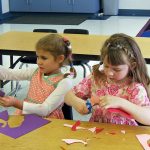What happens during a SCALES assessment?
We are grateful to schools and families for hosting our research. All of our research team have enhanced DBS clearance and experience of working with children. We work with schools/parents to fit with busy timetables and to ensure children enjoy the experience.
Before the assessment
 When we start a research project, we must first get ethical approval from our university to ensure that the children and the information they provide to us are safe and secure. Once we have ethical approval, we contact head teachers to invite them to take part. We provide head teachers with information about the project, such as the types of activities we’ll be asking the children to complete, how many children we would like to see, how long each assessment session will take, and when we would like to come into school. If we are unable to visit school for any reason, we will arrange to see your child at home and communicate directly with parents to arrange a visit.
When we start a research project, we must first get ethical approval from our university to ensure that the children and the information they provide to us are safe and secure. Once we have ethical approval, we contact head teachers to invite them to take part. We provide head teachers with information about the project, such as the types of activities we’ll be asking the children to complete, how many children we would like to see, how long each assessment session will take, and when we would like to come into school. If we are unable to visit school for any reason, we will arrange to see your child at home and communicate directly with parents to arrange a visit.
We also send an information and consent form to each child’s parents to get permission for their participation. This provides parents with all the information they will need and also includes our contact details so parents can contact us directly if they have any questions. Taking part is entirely voluntary and parents can change their minds with no adverse consequences.
We will then arrange dates to visit each child’s school/home which fits in with their busy schedule.
The assessment
 On an agreed date a member of our research team will visit school/home to see children either individually or in groups. All of our researchers are fully trained, have many years experience of working with children in school settings and all have received enhanced disclosure from the Disclosure and Barring Service (DBS).
On an agreed date a member of our research team will visit school/home to see children either individually or in groups. All of our researchers are fully trained, have many years experience of working with children in school settings and all have received enhanced disclosure from the Disclosure and Barring Service (DBS).
We usually aim to arrive at school half an hour before school starts, to meet with teachers, answer any questions and to set up our equipment. We always work with teachers to fit our assessments into the busy school day and to ensure that children don’t miss out on key lessons.
If for any reason we are unable to visit a child’s school/home, we are able to carry out the assessment online via Zoom. In this case, the assessment works in exactly the same way and each child completes the same tasks as in an in-person assessment. The researcher will be on hand throughout the assessment to help with any technical difficulties and answer any questions that the child may have.
Children will always first be provided with an information sheet which explains what the assessment involves so that they can decide whether they would like to take part. During the assessment, the children will be asked to complete a number of different activities, but will be given lots of breaks in-between activities to make sure they don’t become over-tired. Children have great fun taking part in our research and at the end of the session each child is presented with a certificate or stickers, to thank them for taking part.
What happens after the assessment?
 The information collected either at school or at home is kept strictly confidential. All information will be kept in locked filing cabinets or on a password protected database at the University. Assessment information is identified by code number, and not the child’s name. Names are linked to code numbers in a database that is stored separately to the data. At the end of a study, we aim to archive anonymous data in a UK data repository (such as the UK Data Archive) so that other research groups can ask and answer different questions with our data. These researchers are not able to contact participants and will not be able to identify participants from the information provided. Making data available in this way ensures that research funding yields far-reaching benefits.
The information collected either at school or at home is kept strictly confidential. All information will be kept in locked filing cabinets or on a password protected database at the University. Assessment information is identified by code number, and not the child’s name. Names are linked to code numbers in a database that is stored separately to the data. At the end of a study, we aim to archive anonymous data in a UK data repository (such as the UK Data Archive) so that other research groups can ask and answer different questions with our data. These researchers are not able to contact participants and will not be able to identify participants from the information provided. Making data available in this way ensures that research funding yields far-reaching benefits.
We are primarily engaged in research and research-related activities. As such, we are not able to discuss individual children or offer educational or clinical advice about an individual child. But we aim to send schools and families regular newsletters to update them on our research findings.